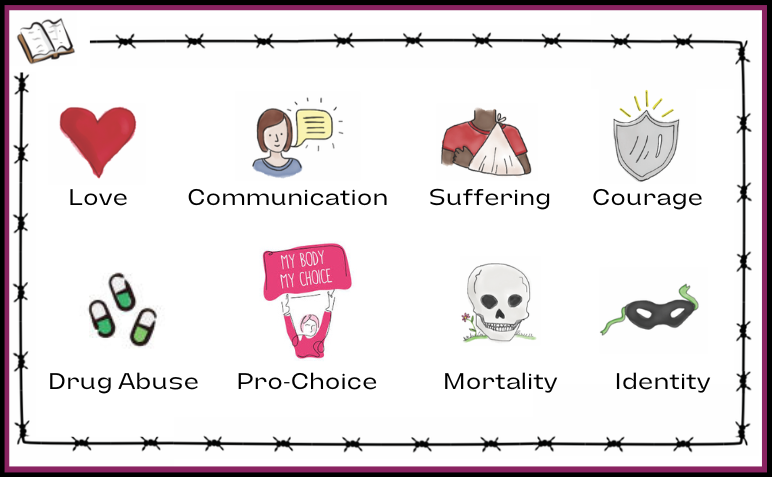Themes in PARALLEL LIVES
Parallel Lives is an adventure story, a romance, a tragedy with comic relief, and a modern retelling of the epic of the Trojan War. Its characters are richly developed and memorable, and their varied personalities and disparate responses to the challenges of life serve to advance the plot of Parallel Lives. These wonderful characters provide readers of all ages with someone with whom they can identify. The situations the characters find themselves in are an excellent source for reflection and discussion. Some of their actions highlight issues that are important in today’s world.
The main characters of Parallel Lives, Alexander Eastgard, Hector Gonzalez, and Helen Fletcher, all make choices, based on emotion, often on a whim, often without consideration, that have profound and long-lasting effects on the rest of their lives. All of them experience regret, and all three react to their regret differently. Hector, the poster child for the unexamined life, lashes out and blames others for his problems. Helen silently lives a lie, internalizing a secret that haunts her for many years. Alexander, overcome by the magnitude of his poor judgment and the betrayal he suffers, flees from an intolerable, painful situation.
Substance abuse is an issue faced by two characters of Parallel Lives. Hector starts off as a nicotine addict and quickly works up to hard drugs, cocaine, and later heroin. He cannot function independently in the world and is reliant on money from his family. When that is no longer available, he becomes a pathetic shadow of a human being, living on the streets, relying on hand-outs. Alexander’s mother Olivia is an alcoholic; in contrast to Hector, she is relatively discreet. She maintains her place in society and assiduously cares for her home and her family. Even in the late stages of the fatal illness that her drinking has caused, she uses the last of her energy to ensure that her home is immaculately clean. The personalities of Hector and Olivia are polar opposites; these two characters serve to illustrate very different manifestations of addiction.
A woman’s right to choose is a major issue these days. Two young women in Parallel Lives become pregnant unintentionally. One of them seriously considers having an abortion as an easy way to solve this looming problem, although because of difficulty obtaining the procedure, she does not move forward with that plan. Years later, as her son grows up, she remembers with horror that she had considered ending his life, and is grateful that she did not have an abortion. If she had easy access to abortion, her life and her husband’s life would have been drastically different. Did she make the right choice?
Parallel Lives takes place across two generations. In the course of that time, characters age, and some of those once young and beautiful, who have taken their looks for granted, lose their youth and toned physiques. Helen is the best example of this phenomenon. She reacts to this realization with denial, with shock, and ultimately with a resolution to exercise and lose weight.
Several of the characters suffer the pain of unrequited love. Helen is infatuated with Hector; she has an unrealistic view of this handsome but wayward young man and of her own value to him. It is only at their last meeting that she begins to see him as he really is, and better understands what she means to him. She is abruptly cured of her infatuation. Similarly, Alexander is infatuated with Helen, seeing her as the ideal woman, a woman of legendary beauty, nearly a goddess. When he learns more about her activities while he was working hard at medical school, this ideal image crumbles, and his love is no more. Giuli Stewart was besotted beginning with Alexander from Chapter 1 and continuing until the last pages of the book. He never disappoints her, never displays the character flaws that cure Helen of her love of Hector, and Alexander of his love of Helen, making unfortunate, faithful Giuli truly a tragic figure.
Parallel Lives also deals with the influence of upbringing on behavior. Hector Gonzalez has two biological children. One of them, Elena, is raised mainly by Hector’s mother, who spoils and coddles her, and Elena ends up self-absorbed and ruthlessly selfish. The other, Mark, is raised by Helen and Alexander. Alexander is probably the parent who played more of a formative role in Mark’s upbringing. Mark ends up as an absolutely wonderful, thoughtful, hard-working young man. While Elena and Mark are not identical twins, they certainly share DNA, and yet they become young adults with completely disparate personalities.
Mark Eastgard and Julia Kaiser are two young people looking for their places in the world, something that many of us have experienced at some point in our lives. Mark is shocked to learn whose son he really is, leading to an “existential dilemma” that Julia helps him resolve. Studious Julia, in turn, is completely out of touch with her anti-academic family and community, but her inquisitive mind and boundless energy make her a strong and appealing young woman who against all odds still manages to find an amazing boyfriend.
But most of all, Parallel Lives is the story of Alexander Eastgard gathering his courage, facing his demons, finding his way home, and becoming a hero.

